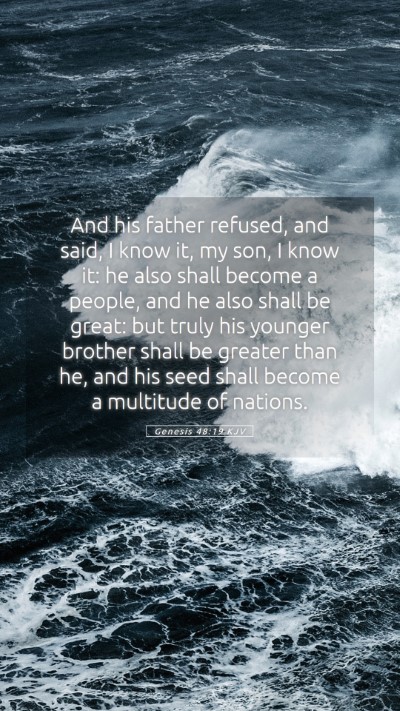Meaning and Commentary on Genesis 48:19
The verse Genesis 48:19 states:
"But his father refused and said, 'I know, my son, I know. He also will become a people, and he also will be great. Nevertheless, his younger brother shall be greater than he, and his offspring shall become a multitude of nations.'" (ESV)
This powerful verse occurs during the moment when Jacob blesses the sons of Joseph, specifically Ephraim and Manasseh. This passage carries significant biblical meaning and implications as interpreted by various scholars. Below is a summary of insights drawn from esteemed public domain commentaries.
Bible Verse Interpretations
Context of the Blessing: Jacob, also known as Israel, is at the twilight of his life. He has gathered his strength to bless Joseph's sons. This act is not merely a traditional blessing; it is an announcement of their future roles and prominence. Matthew Henry points out that the laying of hands and the naming of Ephraim and Manasseh signifies their inclusion in the covenant community.
The Significance of the Sons
According to Adam Clarke, the preference shown to Ephraim over Manasseh is notable. It illustrates a recurring biblical theme where God often chooses the younger or seemingly lesser character for His greater purposes. This choice highlights God’s sovereignty and His ability to elevate those who may be considered the least amongst men.
Ephraim's Prominence
Albert Barnes emphasizes that Ephraim’s greatness represents not just physical prosperity but spiritual influence. Ephraim would become the leading tribe of Israel, embodying the fulfillment of God’s promises to Abraham, Isaac, and Jacob. The “multitude of nations” signifies both the literal descendants of Ephraim and the broader spiritual legacy that would unfold through the lineage leading to Christ.
Understanding Scripture: Theological Implications
The implications of Genesis 48:19 extend beyond mere historical narrative. Within this passage lies the profound truth concerning divine election and human expectation. Both Matthew Henry and Adam Clarke explore how God's choices defy human reasoning and societal norms.
Divine Sovereignty
The deliberate selection of Ephraim over Manasseh showcases God's sovereignty in choosing how and whom He blesses. This challenge to typical inheritance patterns prompts readers to reflect on their understandings of merit and favor in spiritual contexts.
Reflection on Family Dynamics
Jacob's determined blessing reflects family dynamics and the complications that arise therein. Joseph's attempt to place his elder son first was met with resistance from Jacob, symbolizing that God’s plans often differ from human expectations.
Application of the Verse to Daily Life
Understanding Genesis 48:19 offers useful lessons for modern believers:
- Trust in God's Plan: Just as Jacob honored God’s direction, individuals are encouraged to have faith in divine guidance, especially during uncertain times.
- Value of the Lesser: The elevation of Ephraim over Manasseh serves as a reminder to recognize and nurture the potential within the underestimated or unseen individuals in our communities.
- Legacy of Faith: This verse encourages believers to consider the impact of their spiritual legacies and how their actions can influence generations.
Related Biblical Cross-References
- Genesis 17:4-5: God's covenant with Abraham regarding nations emerging from his lineage.
- 1 Chronicles 5:1-2: Acknowledgment of Ephraim and Manasseh's birthrights.
- Matthew 1:12: Reference to the lineage of Jesus through Joseph.
Conclusion
Genesis 48:19 is a profound verse that encapsulates themes of divine selection, the subversion of human expectations, and the establishment of a spiritual heritage that reverberates throughout the biblical narrative. The insights from public domain commentaries provide a rich theological framework for understanding these complexities and applying them to our lives today, making it significant for any Bible study resources or online Bible study initiatives.


